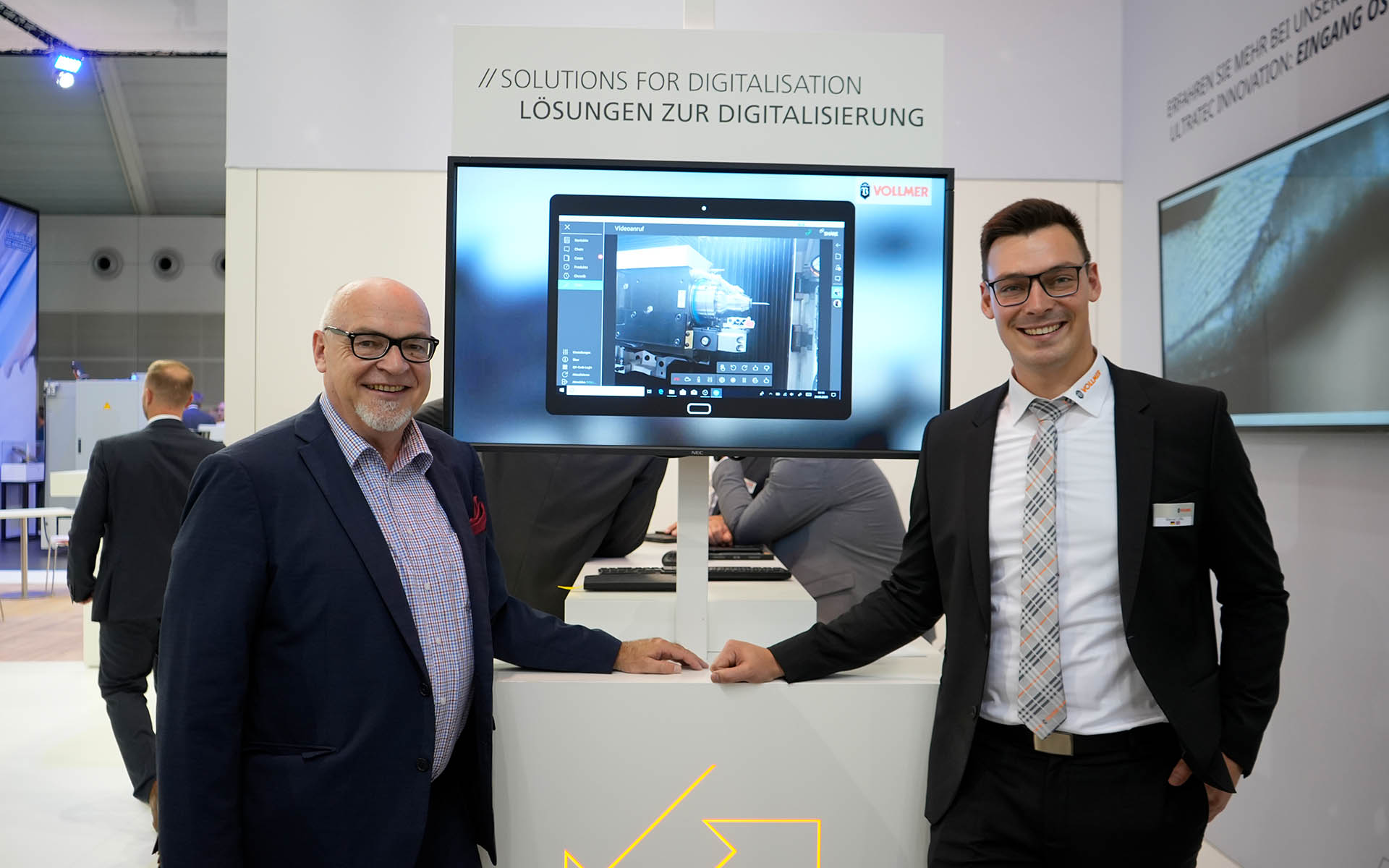Ihr Browser hat eine andere Sprache als die der aufgerufenen Seite. Diese Seite ist auch in ihrer Sprache verfügbar! Möchten Sie zu der Seite in Ihrer Sprache wechseln?
"People are at the heart of digitalisation" 11.01.2023
zur ÜbersichtThe mid-sized manufacturing sector is still in the midst of digital transformation. Georg Kästle knows the way from digital innovations to economically successful products. He has been at home in IT for more than three decades. working as a lecturer at the RWU (University of Applied Sciences Ravensburg-Weingarten). Since the start of 2022, Georg has been CIO (Chief Information Officer) and CDO (Chief Digital Officer) at the VOLLMER plant in Biberach an der Riß.
Question: Hello Mr Kästle. You have been teaching at the University of Applied Sciences Ravensburg-Weingarten since the 1990s, and have established degree programmes in business informatics and digital business, among others. What are the current focal issues for you as a lecturer?
Georg Kästle: Essentially, our job at the RWU is to convey to young people the basics of information technology, and to demonstrate how it's linked with the economy and industry. It is a major concern for us here that we ready the students both in theory and practice. To this end, we have, for instance, set up the Digital Lab. There, we teach how concrete offers can be created from digital innovations. Start-ups can run through their ideas in the Digital Lab and test them in terms of marketability. At the RWU, we also support the established mid-sized sector, which is vast here in Upper Swabia, and which is not infrequently one of the world's 'hidden champions'. Currently, digitalisation is offering medium-sized companies enormous market potential, but it also entails great challenges.
Question: Where is the mid-sized sector in comparison with large companies or globally acting Groups when it comes to digitalisation?
Georg Kästle: No blanket answer is possible here, as there are companies on both sides who are leaders on this path or who lag behind the market. IT-savvy sectors like software developers or electronics manufacturers are further advanced per se than, for instance, handicrafts or trade. Nevertheless, it has to be said that digitalisation is not a process that is ever completed – for any company. We currently see in the mid-sized sector that almost every company has initiated this transformation, but only rarely has IT actually joined with products and services. Large Groups are often already a step ahead here.
Question: What should the mid-sized sector do to advance digital transformation?
Georg Kästle: As in real life, learn from ‘big business’ without making the same mistakes. However, there are differences between the two, as the mid-sized sector often lacks the necessary capacities or specialists to consistently implement this transition. Groups with large IT departments and their own computer centres are at an advantage here. For this reason, smaller companies should try to create synergies that are as sensible as possible. That can be cooperation with other companies or collaboration with independent research facilities like the RWU. In the Digital Lab already mentioned, we sound out digital services and products in terms of their market chances, and support medium-sized companies with the further development of IoT-based (Internet of Things) applications.
Question: Are there also advantages that the mid-sized sector has against big business?
Georg Kästle: Smaller companies are innately more agile than large Groups. If they succeed in incorporating this agility into digital transformation, that is a momentous advantage. But all players should be aware that it's people who are at the heart of digitalisation. This is indeed enabled by technology, but it's people who shape the transformation. In this context, processes are the be-all and end-all, as they must be mapped out in a digital form. Only people are in a position to understand processes and to model them. It's therefore a central requirement that all departments in a company are involved in the transformation. What qualifications/position an employee has or what age they are, plays no role here. Only if everyone is part of the digital trend and collaborates on an overarching vision does digitalisation also pass into the DNA of a company.
Question: Since the start of 2022, you have been helping shape the digital transformation as CIO and CDO at VOLLMER, the sharpening specialist from Biberach. Where along this journey is VOLLMER currently?
Georg Kästle: VOLLMER has created a solid starting point over the past years. The IoT Gateway for its sharpening machines could be mentioned here, for example, or the digital core that is anchored in the ERP system with a high SAP standard. To make more efficient use of its grinding, eroding or laser machines for the processing of circular saws or rotary tools, VOLLMER has started the digital initiative V@dison. The objective is currently to fill V@dison with additional life. To this end, VOLLMER has networked all departments and areas, so that everyone can help shape the transformation. Now, it's about thinking even more holistically and making the staff enthusiastic about the planned projects. It's only by having a strong internal approach to digitalisation that a company can also replicate the strength of this approach externally for customers.
Question: What are the next steps along VOLLMER's journey?
Georg Kästle: We are currently having intensive discussions with those responsible for IT at our customers. This offers us the chance to design our customer relationships more intensively in a different framework. The central challenge is handling the enormous variety of new technologies, understanding these and correctly classifying them in context (between the customer and VOLLMER). It may sound funny, but one of the main jobs of the digital transformation is for the mid-sized sector to make a clever decision on what it isn't doing. If a company implements 100 things which are great but bring no customer benefits, no-one makes progress in digitalisation. At VOLLMER, we have set up a digital team that works with a technology radar, to always keep the focus on customer deployment. This also means that some things are consciously not implemented.
Presse-Kontakt
Ingo WolfMarketing Services












